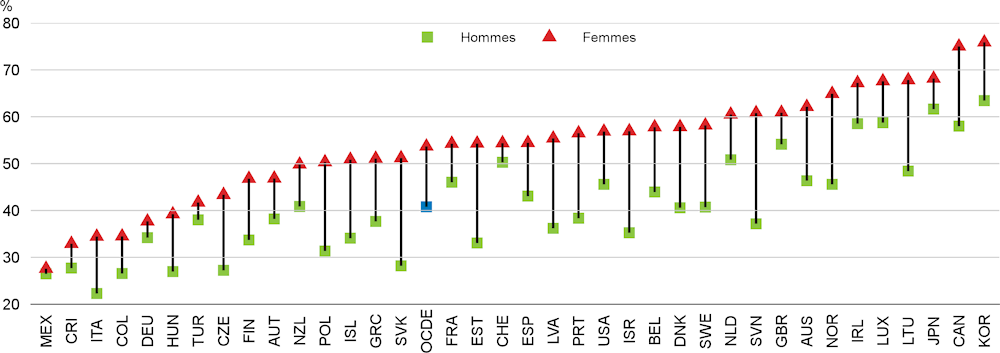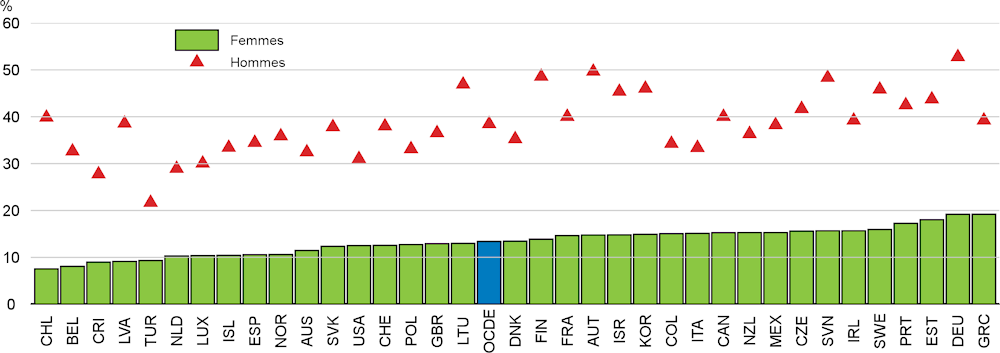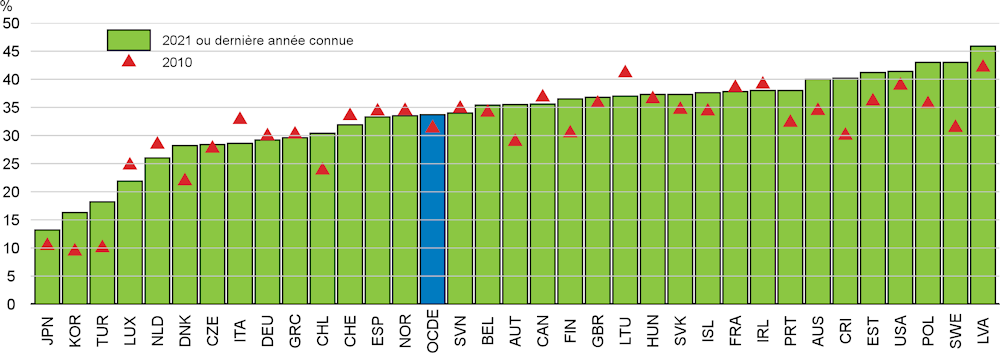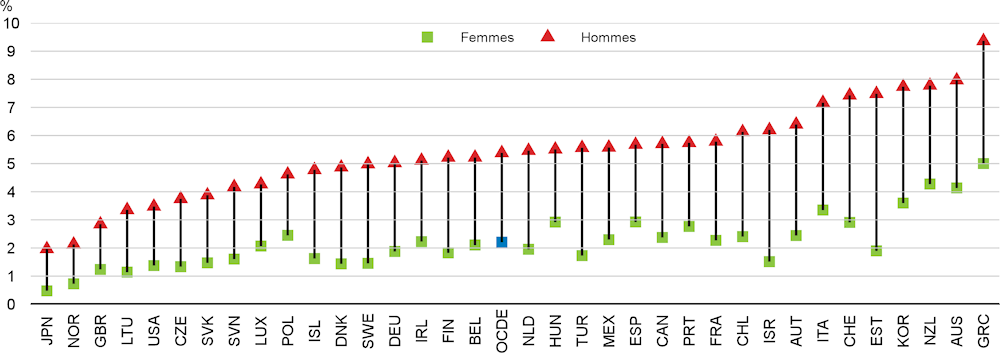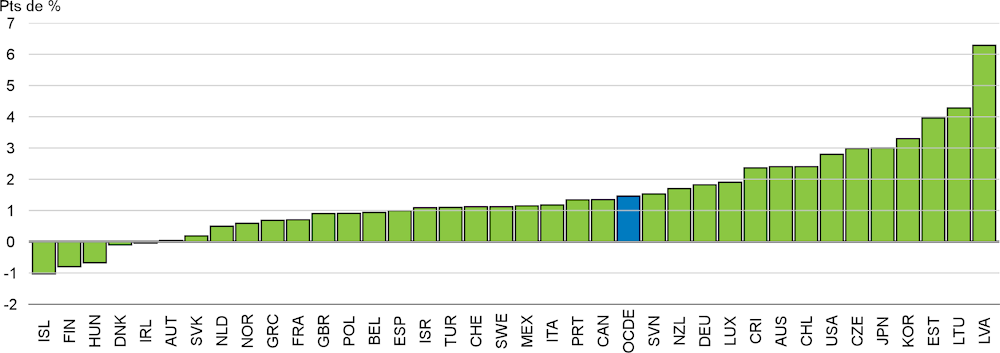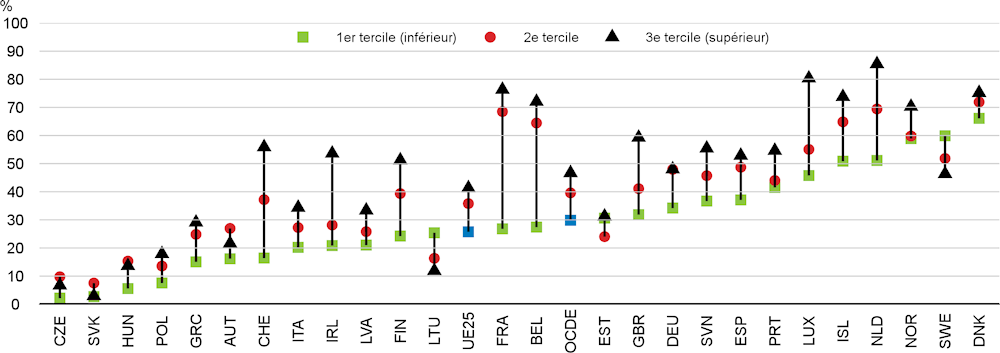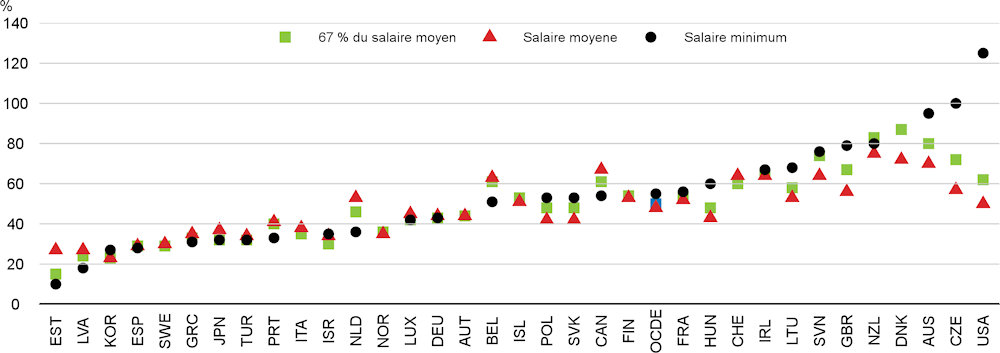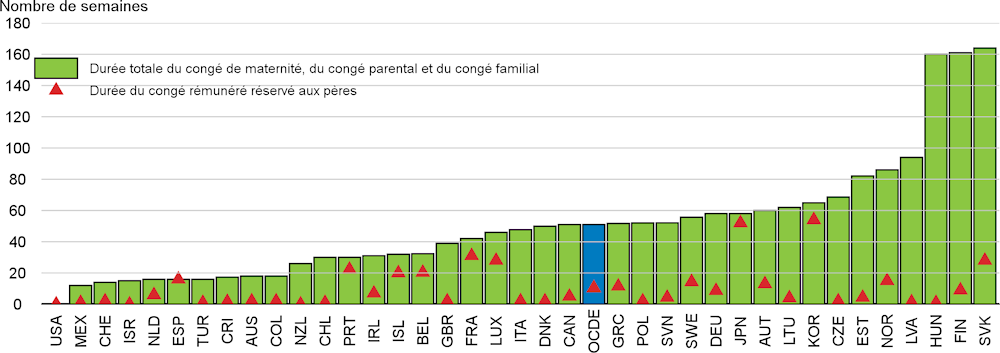Adema, W. et al. (2020), « Family Policies and Family Outcomes in OECD Countries », in Nieuwenhuis, R. et W. Van Lancker (dir. pub.), The Palgrave Handbook of Family Policy, Palgrave Macmillan, Cham.
Bettio, F. et A. Verashchagina (2009), Gender Segregation in the Labour Market, Root Causes, Implications and Policy Responses in the EU, Commission européenne, direction générale de l'emploi, des affaires sociales et de l'inclusion.
Brussino, O. et J. McBrien (2022), « Gender stereotypes in education: Policies and practices to address gender stereotyping across OECD education systems », Documents de travail de l'OCDE sur l'éducation, n° 271, Éditions OCDE, Paris.
Carlana, M. (2019), « Implicit Stereotypes: Evidence from Teachers’ Gender Bias », The Quarterly Journal of Economics, vol. 134, n° 3, pp. 1163-1224.
Causa, O. et al. (2023), « Lost in the green transition? From measurement to stylized facts », Documents de travail du Département des Affaires économiques de l'OCDE, Éditions OCDE, Paris, à paraître.
Causa, O. et Å. Johansson (2010), « Intergenerational Social Mobility in OECD Countries », OECD Journal: Economic Studies, vol. 2010/1.
Causa, O., N. Luu et M. Abendschein (2021), « Labour market transitions across OECD countries: Stylised facts », Documents de travail du Département des Affaires économiques de l'OCDE, n° 1692, Éditions OCDE, Paris.
Cavalcanti, T. et J. Tavares (2016), « The Output Cost of Gender Discrimination: A Model-Based Macroeconomics Estimate », The Economic Journal, vol. 126, pp. 109-134.
Charlton, E. (2023), « This is why women are bearing the brunt of the cost of living crisis, according to research », Forum économique mondial.
Ciminelli, G., C. Schwellnus et B. Stadler (2021), « Sticky floors or glass ceilings? The role of human capital, working time flexibility and discrimination in the gender wage gap », Documents de travail du Département des Affaires économiques de l'OCDE, n° 1668, Éditions OCDE, Paris,
Criscuolo, C. et al. (2021), « The human side of productivity: Uncovering the role of skills and diversity for firm productivity », OECD Productivity Working Papers, n° 29, Éditions OCDE, Paris.
Cuberes, D. et M. Teignier (2016), « Aggregate Effects of Gender Gaps in the Labor Market: A Quantitative Estimate », Journal of Human Capital, vol. 10, n° 1, pp. 1-32.
Curtis, M., C. Schmid et M. Struber (2012), « Gender diversity and corporate performance », Credit Suisse Research Institute, Zurich.
Denis, E. (2022), « Enhancing gender diversity on boards and in senior management of listed companies », documents de travail de l’OCDE sur la gouvernance d’entreprise, n° 28, Éditions OCDE, Paris.
Duflo, E. (2012), « Women empowerment and economic development », Journal of Economic Literature, vol. 50, n° 4, pp. 1051-79.
Encinas-Martín, M. et M. Cherian (2023), Gender, Education and Skills: The Persistence of Gender Gaps in Education and Skills, Études de l'OCDE sur les compétences, Éditions OCDE, Paris.
Galinsky, A. et al. (2015), « Maximizing the Gains and Minimizing the Pains of Diversity: a Policy Perspective », Perspectives on Psychological Science, vol. 10, n° 6.
Goodman, L., J. Zhu et B. Bai (2016), « Women Are Better than Men at Paying Their Mortgages », Urban Institute Research Report, Washington, D.C.
Harding, M., D. Paturot et H. Simon (2022), « Taxation of part-time work in the OECD », Documents de travail de l'OCDE sur la fiscalité, n° 57, Éditions OCDE, Paris.
HM Treasury (2023), Spring Budget 2023, Policy Paper, Londres.
Hung, A., J. Yoong et E. Brown (2012), « Empowering Women Through Financial Awareness and Education », Documents de travail de l’OCDE sur les finances, l'assurance et des pensions privées, n° 14, Éditions OCDE, Paris.
Kleven, H. (2019), « Child Penalties across Countries: Evidence and Explanations », AEA Papers and Proceedings, vol. 109, pp. 122-26.
Lassébie, J. et al. (2019), « Levelling the playing field: Dissecting the gender gap in the funding of start-ups », OECD Science, Technology and Industry Policy Papers, n° 73, Éditions OCDE, Paris.
Levanon, A., P. England et P. Allison (2009), « Occupational feminization and pay: assessing causal dynamics using 1950-2000 U.S. Census data », Social Forces, vol. 88, n° 2, pp. 865-892.
Lusardi, A. et O.S. Mitchell (2008), « Planning and Financial Literacy: How Do Women Fare? », American Economic Review, vol. 98, n° 2, pp. 413-17.
Maravalle, A. et A. González Pandiella (2022), « Expanding access to finance to boost growth and reduce inequalities in Mexico », Documents de travail du Département des Affaires économiques de l'OCDE, n° 1717, Éditions OCDE, Paris.
Noland, M., T. Moran et B. Kotschwar (2016), « Is gender diversity profitable?Evidence from a global survey », Peterson Institute for International Economics Working Paper Series, nos 16-3, Washington D.C.
OCDE (2023a), Joining Forces for Gender Equality: What is Holding us Back?, Éditions OCDE, Paris.
OCDE (2023b), Job Creation and Local Economic Development 2023: Bridging the Great Green Divide, Éditions OCDE, Paris.
OCDE (2023c), Economic Policy Reforms 2023: Going for Growth, Éditions OCDE, Paris, à paraître.
OCDE (2023d), OECD Economic Surveys: Australia 2023, Éditions OCDE, Paris, à paraître.
OCDE (2023e), Gender pay gap reporting in OECD countries: Guidance for implementation and monitoring, Éditions OCDE, Paris, à paraître.
OCDE (2023f), OECD Economic Surveys: Sweden 2023, Éditions OCDE, Paris, à paraître.
OCDE (2023g), « Bonnes pratiques de l’OCDE en matière de budgétisation sensible au genre», Revue de l’OCDE sur la gestion budgétaire, vol. 23, n° 1.
OCDE (2022a), « Same skills, different pay: Tackling Gender Inequalities at firm level », Focus, OCDE, Paris.
OCDE (2022b), Regards sur l'éducation 2022 : Les indicateurs de l'OCDE, Éditions OCDE, Paris.
OCDE (2022c), Politique fiscale et égalité femmes-hommes : Un bilan des approches nationales, Éditions OCDE, Paris.
OCDE (2022d), OECD Economic Surveys: United Kingdom 2022, Éditions OCDE, Paris.
OCDE (2021a), Towards Improved Retirement Savings Outcomes for Women, Éditions OCDE, Paris.
OCDE (2021b), Pensions at a Glance 2021: OECD and G20 Indicators, Éditions OCDE, Paris.
OCDE (2021c), Entrepreneurship Policies through a Gender Lens, OECD Studies on SMEs and Entrepreneurship, Éditions OCDE, Paris.
OCDE (2021d), OECD Economic Surveys: Sweden 2021, Éditions OCDE, Paris.
OCDE (2020a), « Women at the core of the fight against COVID-19 crisis », Les réponses de l’OCDE face au coronavirus (COVID-19), OCDE, Paris.
OCDE (2020b), Perspectives de l'emploi de l'OCDE 2020 : Crise du COVID-19 et protection des travailleurs, Éditions OCDE, Paris.
OCDE (2020c), Comment va la vie ? 2020 : Mesurer le bien-être, Éditions OCDE, Paris.
OCDE (2020d), « Distributional risks associated with non-standard work: Stylised facts and policy considerations », Série Lutte contre le coronavirus (COVID‑19), OCDE, Paris.
OCDE (2020e), « How to strengthen the integration of migrant women? », Débats sur les politiques migratoires, n° 25, OCDE, Paris.
OCDE (2019), The Role of Education and Skills in Bridging the Digital Gender Divide, Evidence from APEC Economies, OCDE, Paris.
OCDE (2018a), L’ascenseur social en panne ? Comment promouvoir la mobilité sociale, Éditions OCDE, Paris.
OCDE (2018b), Early Learning Matters, OCDE, Paris.
OCDE (2018c), Bridging the Digital Gender Divide, Include, Upskill, Innovate, OCDE, Paris.
OCDE (2017), Atteindre l'égalité femmes-hommes : un combat difficile, Éditions OCDE, Paris.
OCDE (2015), OECD Toolkit for Mainstreaming and Implementing Gender Equality: Implementing the 2015 OECD Recommendation on Gender Equality in Public Life, OCDE, Paris.
OCDE (2013a), Women and Financial Education: Evidence, Policy Responses and Guidance, Éditions OCDE, Paris.
OCDE (2013b), Addressing women’s needs for financial education, Réseau international sur l'éducation financière (INFE), OCDE, Paris.
OCDE (2011), Taxation and Employment, Études de politique fiscale de l'OCDE, n° 21, Éditions OCDE, Paris.
Office National de Médiation de la Suède (2021), Wage Differences Between Women and Men 2020, Stockholm.
Parlement européen (2023), « International Women’s Day: Gender aspects of energy poverty », Briefing, 1er mars 2023.
Périvier, H. (2014), « Men and women during the economic crisis: Employment trends in eight European countries », Revue de l'OFCE, vol. 133, n° 2, pp. 41-84.
Stevenson, B. (2021), « Women, work, and families: recovering from the pandemic-induced recession », Economic analysis, The Hamilton Project, Washington,D.C.
Touzet, C. (2023), « Teleworking through the gender looking glass: Facts and gaps », Documents de travail de l'OCDE sur les questions sociales, l'emploi et les migrations, n° 285, Éditions OCDE, Paris.
Woolley, A. et al. (2010), « Evidence for a collective intelligence factor in the performance of human groups », Science, vol. 330, n° 6004.






